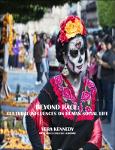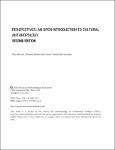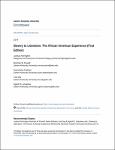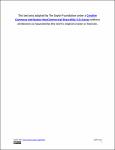Search
Author
- Caitlin, Finlayson (1)
- Catherine, Solheim (1)
- Debra, Miles (1)
- Elizabeth, Wieling (1)
- next >
Subject
- Beyond Race (1)
- challenging concepts s... (1)
- Cultural Anthropology (1)
- Cultural Influences (1)
- next >
Date issued
Has File(s)
- true (9)
Search Results
Intercultural learning: Critical preparation for international student travel aims to take students beyond practical preparation, to equip them with a critical lens through which to view and understand their international experiences. The book leads students toward a deeper understanding of culture and cultural difference through an exploration of challenging concepts such as imperialism, racism, privilege and intercultural practice.
As an adjunct to traditional approaches, the book adds a significant and valuable dimension to the process of preparing students for international study, increasing the potential for meaningful and transformative learning experiences. |
The book is supported by discussion of relevant theory and research in cultural sociology. Beyond Race: Cultural Influences on Human Social Life has stressed learner-centered teaching with the instructor taking on the role of a facilitator of learning. As such, it is expected the instructor will serve as the mediator between the content of this book and learners’ understanding of material on multiple and higher levels. This book does not offer a set of rules in teaching cultural sociology, but rather suggests content and applications to consider and modify as needed by the ever-changing dynamics of instructors and learners. |
Immigrant and Refugee Families: Global Perspectives on Displacement and Resettlement Experiences offers an interdisciplinary perspective on immigrant and refugee families' challenges and resilience across multiple domains, including economic, political, health, and human rights. This new edition has been revised and updated from the original 2016 edition. |
Our approach to cultural anthropology is holistic. We see the interconnectedness of cultural practicesand, in all of the chapters, we emphasize the comparison of cultures and the ways of life ofdifferent peoples. We start with Laura Nader's observation that cultural differences need not be seenas a problem. In our complicated world of increasing migration, nationalism, and climate challenges,cultural diversity might actually be the source of conflict resolution and new approaches to ensuringa healthier world. Indeed, as Katie Nelson reminds us, anthropology exposes the familiarity in theideas and practices of others that seem bizarre. Robert Borofsky advocates for anthropology's abilityto empower people and facilitate good. Borofsky calls on anthropologists to engage with a widerpub... |
Native Peoples of North America is intended to be an introductory text about the Native peoples of North America (primarily the United States and Canada) presented from an anthropological perspective. As such, the text is organized around anthropological concepts such as language, kinship, marriage and family life, political and economic organization, food getting, spiritual and religious practices, and the arts. Prehistoric, historic and contemporary information is presented. Each chapter begins with an example from the oral tradition that reflects the theme of the chapter. The text includes suggested readings, videos, and classroom activities. |
Rather than present students with a broad, novice-level introduction to geography, emphasizing places and vocabulary terms, this text approaches geography as experts understand the discipline, focusing on connections and an in-depth understanding of core themes. This thematic approach, informed by pedagogical research, provides students with an introduction to thinking geographically. Instead of repeating the same several themes each chapter, this text emphasizes depth over breadth by arranging each chapter around a central theme and then exploring that theme in detail as it applies to the particular region. In addition, while chapters are designed to stand alone and be rearranged or eliminated at the instructor's discretion, the theme of globalization and inequality unites all of t... |
Knowing Home attempts to capture the creative vision of Indigenous scientific knowledge and technology that is derived from an ecology of a home place. The traditional wisdom component of Indigenous Science—the values and ways of decision-making—assists humans in their relationship with each other, the land and water, and all of creation. Indigenous perspectives have the potential to give insight and guidance to the kind of environmental ethics and deep understanding that we must gain as we attempt to solve the increasingly complex problems of the 21st century. |
Slavery to Liberation: The African American Experience gives instructors, students, and general readers a comprehensive and up-to-date account of African Americans’ cultural and political history, economic development, artistic expressiveness, and religious and philosophical worldviews in a critical framework. It offers sound interdisciplinary analysis of selected historical and contemporary issues surrounding the origins and manifestations of White supremacy in the United States. By placing race at the center of the work, the book offers significant lessons for understanding the institutional marginalization of Blacks in contemporary America and their historical resistance and perseverance. |
Preparing today's students to be effective leaders in their professional lives requires that they hone their cultural intelligence as it is vital to working inter- and intra-culturally in today's global economy. This unique ability to identify, recognize, and acknowledge the differences and similarities that exist between and among cultural groups and systems will set their leadership skills apart from the masses. And when applied, cultural intelligence can bridge the gap in cultural misunderstanding by creating awareness, knowledge, and patience of cultural norms and behaviors. |









